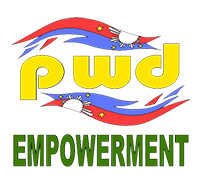A network of organizations of persons with disabilities is asking government to establish a national data of PWDs for easier identification in a bid to organize the differently abled and create an environment that will allow them to become productive members of society.
Emer Rojas, president of the New Vois Association of the Philippines, said a national registry of PWDs is crucial to know where to find each member of the sector so that they can be easily organized and that services may be able to reach them.
“The recent national elections showed that PWDs are willing to take the call and be part of nation-building if only the infrastructures are there to allow them to participate. We believe it is high time to tap into that same energy and allow PWDs to live a decent life like the rest of all Filipinos,” said Rojas, himself a member of the community after losing his vocal cords due to laryngeal cancer caused by excessive smoking and become member of the speech impaired PWDs.
Rojas said there is a need to look at the current situation of PWDs and set the environment to empower them so that they are not left in the dark feeling helpless because of their disability.
NVAP has recently partnered with two other PWD organizations, Tahanang Walang Hagdanan (TWH), and party list group Pilipino With Disabilities Inc. (PWD Inc.) to organize the community and call for reforms that will benefit the differently abled.
Manuel Agcaoili, president and chief executive officer of TWH, suggests that to empower PWDs, there is a need to review and monitor a couple of existing laws that address their needs because most of them are not being implemented.
One example, according to Agcaoili, is Republic Act 10524 which requires “all government agencies, offices and corporations” to reserve one percent of its workforce for PWDs. There is also RA 10070 which mandates the creation of PWD offices in all first and third class municipalities and cities nationwide.
“In addition to these laws we also have Executive Order 417 that mandates government to provide equal opportunities for PWDs to engage in business. The Implementing Rules and Regulations of EO417 has just recently been signed by the lead secretaries this March. But of course we don’t see all these being implemented right now so we need to raise people’s awareness and call on government not to allow these laws to just stay on paper but executed on the ground.
Meanwhile, Michael Barredo, founder of party list organization PWD Inc., said a national registry will also help government locate polling places where facilities for the differently abled must be set up.
“It’s almost impossible to empower PWDs if their right to vote is curtailed and their right to represent the community by sitting in government is repressed. There is no equal opportunity if PWDs are not given a chance to take part in nation building,” said Barredo.
Rojas said the three organizations have started going around the country to meet local PWD communities to assess further their basic concerns and build their capacities to engage the government.
The three organizations hope that a national PWD registry would also pave the way for service providers to identify livelihood opportunities for the community.
“PWDs can move forward and advocate more of their rights as mandated by the United Nations Convention on the Rights of Persons with Disabilities if they are fully aware of these laws and have enough food on the table,” said Rojas, also the PWD sector representative at the National Anti-Poverty Commission. “Thus we intend to build their capacity and provide them with sustainable livelihood and employment opportunities to encourage more advocates and leaders from the sector”, Rojas added. #
##
References:
Cher Jimenez
